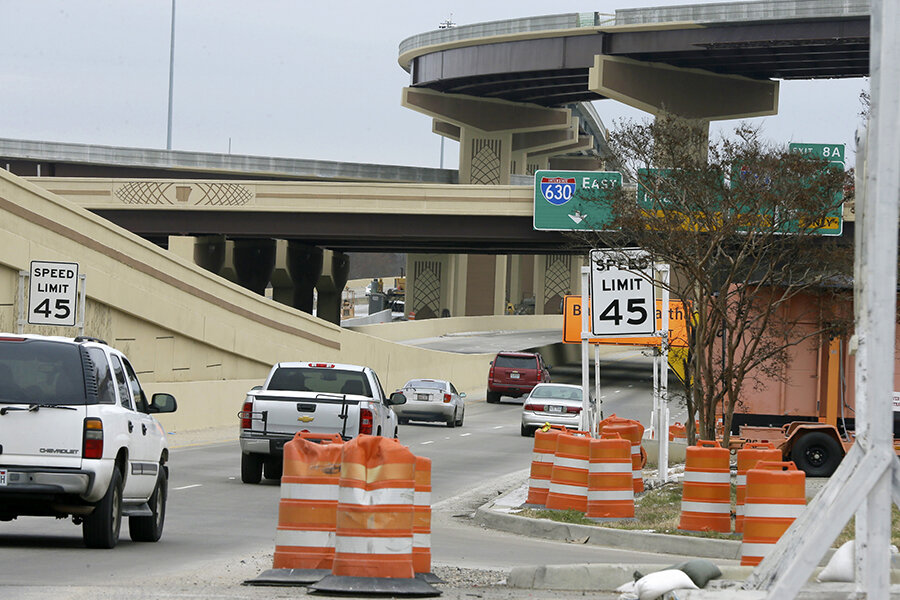Senate passes transportation bill
Loading...
| Washington
The Senate passed a long-term transportation bill, but with House lawmakers already dispersed for their August recess, the bill will become just one more sticky issue on a jam-packed congressional agenda in the fall.
The $350 billion long-term bill was approved Thursday on a 65-34 vote with bipartisan support. It would make changes to highway, transit, railroad and auto safety programs, but its sponsors were only able to find enough money to pay for the first three years of the six-year bill.
Senate Majority Leader Mitch McConnell, R-Ky., called the bill's passage, "a win for our country."
"Many thought we'd never get here, but we have," he said.
Immediately after the vote, the Senate turned to a three-month patch previously passed by the House that extends the government's authority to process highway and transit aid payments to states through Oct. 29. Without congressional action, that authority expires at midnight Friday. House Republican leaders opted for the patch to give themselves more time to work on a long-term — and long-sought — transportation bill.
Lawmakers have said they are loath to take up yet another short-term transportation funding extension — this will be the 34th extension since 2009. But Republicans and Democrats don't want to see transportation aid cut off, and they are eager to pass an amendment to the extension bill that fills a $3.4 billion hole in the Department of Veterans Affairs' budget. The money gap threatens to force the closure of hospitals and clinics nationwide.
The delay on House action on a long-term transportation bill adds one more messy fight to a fall agenda already crammed with difficult, must-pass legislation. Twelve annual spending bills face a Sept. 30 deadline but are being held up by a clash over the Confederate flag. Congress must also decide whether to approve or disapprove President Barack Obama's Iran nuclear deal, and whether to pass a contentious defense policy bill that faces a veto threat from the White House. Another fight is certain over raising the nation's borrowing authority.
Spending authority for the Federal Aviation Administration expires Sept. 30. Since long-term bills to set aviation policy have yet to be introduced in either the House or the Senate, lawmakers acknowledge they will have to pass short-term extensions there as well.
The Senate's long-term transportation bill also renews the Export-Import Bank, which makes low-interest loans to help U.S. companies sell their products overseas. The bank's charter expired June 30 in the face of opposition from conservatives, who call it corporate welfare. A fight in the House over renewal of the bank is also likely.
The long-term transportation bill shores up the federal Highway Trust Fund for three years by using about $45 billion in revenue increases and making spending cuts elsewhere in the federal budget. The largest source of funds is $16 billion that would be saved by reducing the dividend rate the government pays to large banks.
The bill also attempts to speed up environmental reviews of construction projects and encourages states to impose user fees on electric vehicles because they use roadways but don't contribute to federal gas tax revenues. It also sets aside money for major projects and directs highway aid to major freight transportation corridors, starting with $1.5 billion in fiscal 2016 and increasing to $2.5 billion in 2021.
The bill shores up the federal Highway Trust Fund for three years by using about $45 billion in revenue increases and making spending cuts elsewhere in the federal budget. The largest source of funds is $16 billion that would be saved by reducing the dividend rate the government pays to large banks.
The bill also attempts to speed up environmental reviews of construction projects and encourages states to impose user fees on electric vehicles because they use roadways but don't contribute to federal gas tax revenues. It also sets aside money for major projects and directs highway aid to major freight transportation corridors, starting with $1.5 billion in fiscal 2016 and increasing to $2.5 billion in 2021.
The safety provisions are the most controversial transportation part of the bill both for what they include and what they don't include. The bill requires that rental car agencies fix cars subject to safety recalls before renting them, but it doesn't include language sought by safety advocates requiring car dealers to fix recalled used cars before selling them. It would double the amount the government can fine automakers who don't disclose safety defects from $35 million to $70 million — significantly less than the $300 million sought by the White House. It would force the Federal Motor Carrier Safety Administration to conceal from the public its safety ratings of trucking companies; the trucking industry says the agency's methodology is flawed.





